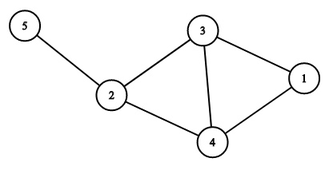Assume that you have $$$k$$$ one-dimensional segments $$$s_1, s_2, \dots s_k$$$ (each segment is denoted by two integers — its endpoints). Then you can build the following graph on these segments. The graph consists of $$$k$$$ vertexes, and there is an edge between the $$$i$$$-th and the $$$j$$$-th vertexes ($$$i \neq j$$$) if and only if the segments $$$s_i$$$ and $$$s_j$$$ intersect (there exists at least one point that belongs to both of them).
For example, if $$$s_1 = [1, 6], s_2 = [8, 20], s_3 = [4, 10], s_4 = [2, 13], s_5 = [17, 18]$$$, then the resulting graph is the following:

A tree of size $$$m$$$ is good if it is possible to choose $$$m$$$ one-dimensional segments so that the graph built on these segments coincides with this tree.
You are given a tree, you have to find its good subtree with maximum possible size. Recall that a subtree is a connected subgraph of a tree.
Note that you have to answer $$$q$$$ independent queries.
The first line contains one integer $$$q$$$ ($$$1 \le q \le 15 \cdot 10^4$$$) — the number of the queries.
The first line of each query contains one integer $$$n$$$ ($$$2 \le n \le 3 \cdot 10^5$$$) — the number of vertices in the tree.
Each of the next $$$n - 1$$$ lines contains two integers $$$x$$$ and $$$y$$$ ($$$1 \le x, y \le n$$$) denoting an edge between vertices $$$x$$$ and $$$y$$$. It is guaranteed that the given graph is a tree.
It is guaranteed that the sum of all $$$n$$$ does not exceed $$$3 \cdot 10^5$$$.
For each query print one integer — the maximum size of a good subtree of the given tree.
1 10 1 2 1 3 1 4 2 5 2 6 3 7 3 8 4 9 4 10
8
In the first query there is a good subtree of size $$$8$$$. The vertices belonging to this subtree are $$${9, 4, 10, 2, 5, 1, 6, 3}$$$.